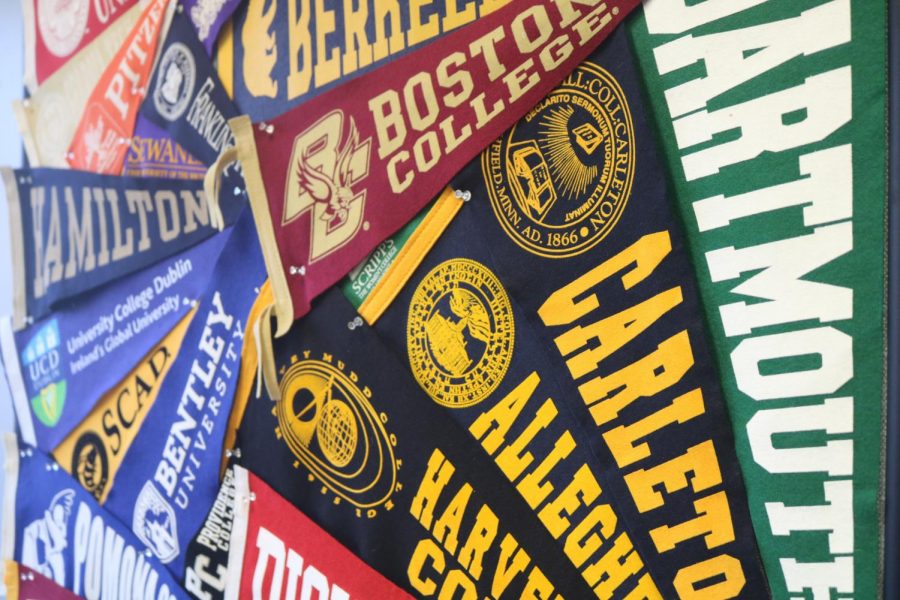College recruitments under the pandemic: experiences from the coaches and administrators
Media: Sarah Wisneski
The collection of college flags pinned at the College Counseling Office
On Dec. 9, Hill School Director of Athletics Seth Eilberg, Student-Athlete and Recruiting Coordinator Mike Murphy, and a variety of officials who work in college athletics held a Zoom meeting in which they discussed athletic recruiting during the coronavirus pandemic.
Murphy prompted the question of where recruiting is under the current COVID restrictions.
Chrissy Findlay, athletics admissions liaison at Bucknell University said, “there is a lot of stress and pressure to really get to know student-athletes and families personally from our coaches.” She shared that coaches could not connect with the student-athletes as they used to under the current situation.
Mike McGarvey, head basketball coach at Lycoming College gave his advice for student-athletes and families maneuvering through the application process.
“There is a heightened sense of urgency from a prospect standpoint, especially with some younger classes.” He mentioned that there are limited interpersonal connections under the pandemic, and to take the initiative, students should “take ownership, be persistent, and try to follow what you want instead of waiting for college coaches to reach out to you.”
Nat St. Laurent, head Men’s Lacrosse coach at Ohio Northern University added that his team “only allowed six visits a day through our admission offices,” thus, student-athletes and families need to do more research and find the program they think they fit and the school they like so they don’t waste the coach’s time and their own time. “Be tactical and accountable as you go through this,” he concluded.
From an administrator’s prospect, Cathy Foto, associate athletics director & senior women’s administrator at SUNY Delhi, suggested that “families can get a lot of the information that’s out there by going to the National Collegiate Athletic Association’s website as well as each division’s website.” She shared that “when things break, it comes out first on social media,” and the website is a great resource.
“For us, when we are reviewing an application, we are trying to come up with a story as to who the student is,” said Findlay as she shared tips for the applicants. “Priorities are about preparedness, and how do we envision them being engaged in the campus community.” It’s about uniqueness and to turn the admission officers into your advocates.
When asked about the importance of a recruitment service, Stephen Toomey, assistant Men’s Lacrosse coach at Tufts University said that “there is no harm in using them at all, I don’t see anything negative to them besides the financial piece, but they are not needed.” He shared that highlight tapes or personal websites that student-athletes made work just fine, and being keen on emails will do the work in communication.
“I prefer student-athletes to reach out to me,” St. Laurent said. He mentioned that from his experiences, the same exact email he gets from the services could be sent to many other coaches. “My assistant can look through those emails, I want to hear directly from the parent or the young person, mainly the young person, and to get to know them,” St. Laurent said. “I want the purity, and I want this to be a genuine process of getting to know families. I’m very firm on relationships and fostering those.”
When talking about how coaches distinguish athletes on showcase events, McGarvey said that “it’s a necessary thing to attend some of the showcases or tournaments that are highly promoted.” Since athletes’ highlight tapes naturally always look good, according to McGarvey it comes down to the showcase events for coaches to distinguish athletes they want.
Foto added that from her experiences, recruiting varies in different sports and in different divisions, even in different areas. It is important to “do the homework when you are interested in a school and find out what they are looking for.”
As Hill student-athletes look ahead to their recruiting process, panels such as this provide valuable insight.


























